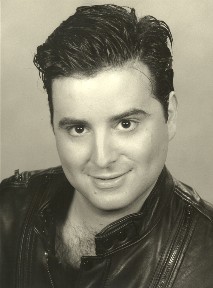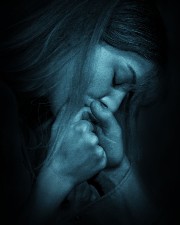Waiter Psychosis
 We anticipated a few bits of gravel showing up in one, or maybe two customers' salads. But when we start finding bits of glass it probably should be a wake up call. It isn't.
We anticipated a few bits of gravel showing up in one, or maybe two customers' salads. But when we start finding bits of glass it probably should be a wake up call. It isn't.Let's take a step backwards here, you and I, from the grim, hangman's tone of the last few posts. It's now before my dead friend Pam and I begin our dance in the dark, before I decide to leave New York, before I am told by the creepy astrologer that without love I am nothing.
I am nineteen, a year out of the American Academy of Dramatic Art, two years from moving to Los Angeles. Waiting tables is what I do while pretending to have a career as an actor. The thing is, I'm actually really good at it. I have the multitasking capabilities of a soccer mom, which is what a good waitron-unit must have if any level of competence is to be mastered. It's like throwing several small dinner parties at once, where everything has to come out at the right time if the courses are going to work out, and where every guest has an allergy he or she failed to phone you about beforehand.
While living in New York I work in a number of places, most of them fairly respectable, but all of them managed and/or owned by specimens from a vile, hostile, cruel-just-for-fun, mistrustful, abusive subspecies of the human race. By and large, restaurant owners and managers are just not nice. They fire waitresses for not giving them blowjobs. They think racial and sexual slurs are funny. They deal drugs on the premises and never share.
The kitchen staffs are difficult in a different way, and unlike with the owners and managers, if you prove yourself to the cooks and prep guys (always guys) then an atmosphere of mutual if distant respect can prevail. Every kitchen staff is composed of the same ethnic group, be it Korean, Caribbean, Puerto Rican, Cuban, Chinese, or Indian, and they are all invariably hostile to waitpeople, at least initially, probably because in the places I wait tables most of the waitpeople were white and working with no expectation of making it a career. The kitchen staff think of us as dilettantes, guilty until proven innocent. It is physically very hard work, especially in New York, where storage basements are usually reached by going outside, wrestling open two huge metal doors in the sidewalk, and descending down perilous steps to dark, dank, moldy, rat-infested caverns. Eat and enjoy.
I never knowingly put gravel or glass in a customer's salad. It just happens THIS ONE TIME at a place owned by a notorious cokehead who constantly shows his penis to all of us, whether we want to see it or not. (It isn't even particularly large or interesting - not unless white pubic hair gives you a big thrill.) Anyway, there is an enormous refrigerated salad bin in the kitchen that has to be replenished by the waitpeople, who are required to haul gigantic trash cans full of pre-prepared, cancerous, phosphate-preserved salad up the basement steps, through the metal doors, across a long length of sidewalk, and into the kitchen.
Doing this in the snow is its own little holiday on ice. If we stuff enough salad in the trash cans however - smashing the greens down, packing them as tightly as possible, we can often manage to make only one trip in an evening's shift rather than having to do the whole thing twice.
So we load the salad bins and jump on top of them, mashing the salad down with our feet until the bin's capacity reaches its limit.
The gravel and glass must come from our shoes. I suppose we could put something between our shoes and the salad itself, some plastic wrap or whatever, but why would we?
At this particular restaurant they like to promote you to senior staff as soon as they can. I am senior staff at nineteen even though I'm not even technically allowed to sell alcohol yet. We serve the full menu until 4:30 in the morning, every night of the week. The senior staff member selected to work the late-late part of the night arrives two hours into the dinner shift at 6:30. By 9:30 or 10:00 some of the other waitpeople are allowed to leave, as the dinner crowd dwindles. More depart by 11:30 or midnight, then at 1:00 in the morning comes magic time:
One waitperson, one busboy, and one bartender. That's it. Not even a manager.
Sometimes the 1:00 to 4:30 hours are uneventful, but other times you find yourself with twenty tables. A triage situation. A strange mania I call Waiter Psychosis takes control as I juggle the food and drink orders. Any extraneous movement or conversation that interrupts my flow puts the entire mission in jeopardy.
One time I throw sour cream in a woman's face.
Here's how it is: I'm there, it's 2:00, and she is giving me such a hard time, sending things back over and over, three times, four times, and I have so many other customers. She tops off her obnoxiousness by telling me she thinks I 'm not very nice. Me? Not nice? I am niceness itself to my customers, genuinely warm, listening with unfeigned interest to their stories, even the boring ones, the very tedium of them fascinating me. If she wants to tell me I'm not nice, I tell her I'll just show her how not nice I can really be. At least the sour cream is in a paper container. It doesn't bruise her or anything as I fling it at her, its gluey whiteness splattering all over her face. I call her a Miserable Fucking Bitch and tell her to get out and not to come back. Or I'll kill her. (I'm really not kidding. I did this. Which is why I call the syndrome Waiter Psychosis. Not to be cute. But because it is insanity itself that takes over when nerves are stretched too far beyond the breaking point.)
After I chase out the woman who is now as sour on the outside as she is within, I leave a message for the next day's manager telling him of having to throw a drunken lady customer out because she was scaring the other customers by flinging sour cream around and screaming at me when I refused to give her more to drink.
This is in case the sour lady calls to complain. The manager won't think I'm the crazy one. He'll think she is.
Sometimes at the end of one of these really long shifts, after finishing my side work (which is refilling salt and pepper shakers, ketchup bottles, and the like) I blow off steam by hurling entire dishwasher racks full of glasses at the brick walls, leaving a spiky river of shards, taking an almost sexual pleasure from it. I know the Korean kitchen porters arrive in the morning before anyone else and their first task is to sweep the dining room, so not one of the managers or owners will find out.
Whether the sweepers regard all that glass as out of the ordinary never enters my mind. There's always broken glass everywhere at the restaurant anyway. Even in the salads.




